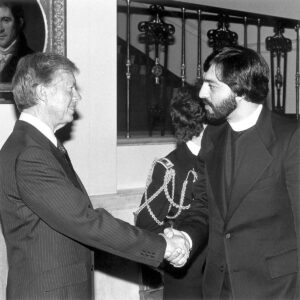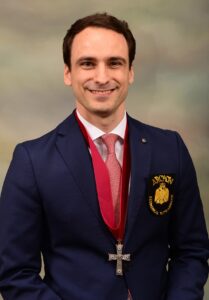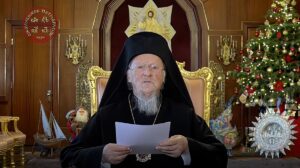In the February 10-16, 2018 weekly edition of The National Herald, a Greek-American publication, Theodore Kalmoukos, Religion Editor, interviewed Archon Michael Psaros who addressed the recent progress made within the Greek Orthodox Archdiocse of America. The interview in its entirety is published below.
Mike Psaros in the Process of Transforming the Greek Orthodox Church in America
By Theodore Kalmoukos
Michael Psaros, a prominent businessman with expertise in how to rehabilitate troubled organizations is in the process of transforming the Greek Orthodox Church in America, whose dire financial situation brought it to the brink of bankruptcy.
With his keen acumen, he spotted the numerous flaws in the Archdiocese’s managerial infrastructure, including a virtual absence of internal controls.
As Archdiocesan Council Treasurer and a man of deep faith and great love for the Church and the Greek-American community, he alerted Archbishop Demetrios, whom he respects a great deal, informing him that unless specific measures are taken, the Archdiocese’s well-being will remain in visible danger.
In an exclusive interview with The National Herald, Psaros is open, honest and transparent in explaining the progress that has been made during the past six months and a transformation that appears visible. A son of the All Saints parish of Weirton, WV, Psaros could very well go down in history as the one who transformed the Orthodox Church in America.
The complete interview follows:
TNH: What is the financial condition of the Archdiocese today?
PSAROS: By the Grace of God, the Greek Orthodox Archdiocese of America (the “Archdiocese”) announced, pursuant to a press release dated January 26, 2018, that it completed an ambitious restructuring process that greatly advanced the financial stability of the Archdiocese.
The Archdiocese is now projected to achieve a balanced budget and generate additional funds that will be applied to retire its financial obligations.
The financial stability of the Archdiocese was achieved without any additional burden placed on its parishes. This is critical. Parish contribution levels in 2018 were maintained at the 2017 levels, resulting in a $1.6 million of savings to our parishes.
The Archdiocese is fundamentally transformed from an administrative and financial perspective. This transformation was achieved in a period of only six months. A significant number of decisive actions were implemented by the Archdiocese that are very impactful individually, but transformative, collectively.
My firm is one of the world’s most successful turnaround investment firms. This is my profession for almost three decades — this is what I do. However, even I am surprised with the speed and effectiveness of the changes. Everyone knows that change is difficult, and that it is difficult for people and organizations to change. Even though the Holy Archdiocese is a canonical, hierarchical, traditional, ecclesiastical institution, it successfully managed through a period of extreme change as well as any organization I have observed.
The Executive Committee, the Officers and Committee Chairs of theArchdiocese arenow focused on the future and only the future. While it is exceedingly disappointing and unfortunate that the Archdiocese experienced a period of financial extremis in its recent past, it can never be allowed to happen again in the future.
Everything is new:
The Archdiocese is now led by new senior lay leadership at the most senior level, led by Archon George Tsandikos, Vice Chairman, Ms. Cathy Walsh, Secretary, and me, serving as Treasurer.
The Archdiocese is now under new management and has a critical new organizational structure. His Grace, Bishop Andonios, Chancellor, assumed key administrative responsibilities after the resignation of the former Director of Administration in September 2017. Father Soterios Baroody was appointed as Chief Financial Officer (“CFO”) of the Archdiocese in April 2017. Prior to his appointment, the Archdiocese did not have the position of CFO, and, in addition, prior the creation of the CFO, the former Executive Director of Administration had control of Administration and Finance. There has now been a clear separation of these functions.
Please note that the Archdiocese former Executive Director of Administration resigned, and the former Director of Finance was terminated. In addition, the former Chairman of the Finance Committee was relieved of his position.
Archon Lazaros Kircos was appointed as the newChairman of the Archdiocese Finance Committee in October 2017. Under Archon Kircos’ leadership, the Finance Committee has taken its expanded role, not only responsibility for the success of the Archdiocese Total Commitment Program, but also its proper role in leading and monitoring those of areas involving budgets, expenditures, finance, treasury, and long term strategic planning. Chairman Archon Kircos has already made numerous critical contributions, especially in the development of the 2018 Budget.
Ms. Elaine Allen was appointed as the new Chairperson of the Archdiocesan Council’s Standing Independent Audit Committee, accompanied by a new group of very qualified and credentialed (emphasis on qualified and credentialed) financial and legal professionals who serve as members of the Committee. Ms. Allen, Chairperson of the Audit Committee, has already made an enormous impact on the operations of the Archdiocese. From a personal perspective, she is one of the most impressive professionals I have ever observed at work after almost 30 years on Wall Street. We are so blessed to have her working on behalf of the Archdiocese. The responsibilities of the Audit Committee include assessing the reliability and accuracy of financial reporting; selecting external auditors; meeting with those auditors to review audit plans and results; reviewing internal controls and developing any necessary remediation plans; and monitoring compliance with applicable laws and regulations pertaining to financial controls.
Please note, so I do not have to repeat myself after every reference to specific actions below, that the Officers and Committee Chairs, only act under the direction of, and with the blessings of, His Eminence, Archbishop Demetrios, Geron of America.
The Leadership Team is committed that the Archdiocese will become a world-class, not-for profit institution from an accountability, transparency perspective.
From a very personal perspective, this Leadership Team is working tirelessly, continuously, methodically, analytically and professionally to address the Archdiocese’s administrative and financial challenges. We are all volunteers, with our own careers, families and numerous other obligations, but we have devoted everything to the Church over the past year.
How did the Archdiocese achieve financial stability?
The Archdiocese achieved stability primarily by (Step 1) establishing new leadership as already discussed, accompanied by critical organizational changes, (Step 2) establishing newinternal controls, policies and procedures governing spending, and (Step 3) significantly reducing its operating cash cost structure by reducing expenses resulting in a new cost structure.
Step 2: Implement internal controls, policies and procedures governing spending
Establishing internal controls, policies and procedures governing expenditures was critical to achieving financial stability. In Spring 2017, the Archdiocese started the process of improving internal controls by management directive. For example, it began to implement policies and procedures governing travel and expense accounts, general and administrative expenditures, staff cell phones, and credit card usage. Further,new vendor management protocols and controls were implemented. While these actions were very effective, they were not enough.
The Officers are determined to create a world-class ecclesiastical not-for-profit institution from a governance and controls perspective. In furtherance of this objective, the Archdiocese retained Grant Thornton to conduct a thorough, independent review and analysis of the operations of the Archdiocese finance function, and to provide an in-depth, third party view of areas where the finance function and the Archdiocese can become more efficient, effective and transparent.
The Archdiocese Council, including its Executive, Audit, Legal and Finance Committees, received the Executive Summary of the Grant Thornton Operations Review in January 2018. The Operations Review makes recommendations on best practices that can be implemented, and will act as a critical guide for the Archdiocese regarding internal controls, practices and procedures.
Step 3: Material Reduction in Operating Cash Costs
The Archdiocese reduced approximately $8 million or approximately 25% of annual operating cash expenditures, thereby eliminating its former structural operating deficit. Approximately $6.5 million, of the $8.0 million in expenditure reductions were implemented in August-September 2017, with the balance in January 2018.As a result, the Archdiocesenow has a budget where receipts exceed disbursements, and extra funds can be used to repay prior financial obligations. The cost reductions, which are permanent and structural, were achieved primarily by reducing Archdiocesan staff levels, reducing general administrative costs, and implementing new vendor management protocols and controls.
Speaking personally, please allow me to make two observations.
First, I ask you, humbly and respectfully, to consider the magnitude of the cost and spending reductions that occurred,and reflect on how quickly and decisively the Archdiocese acted. Substantially all of the $8 million in cost cuts involved people and payroll. Reducing such a significant number of loyal, dedicated, committed and faithful employees was very difficult. This action effected many families, and these reductions were only made after very thoughtful considerations. In addition, a large number of non-employee professionals on payroll, from outside vendors and contractors, were also eliminated.
Second, I ask you again, how many families, companies, or organizations could cut 25% of their total operating expenditures at all, or in such a short period of time?
When did you start, and how long did it take you?
We are now one year into our work, the actual transformation of the Archdiocese has taken place over the past six months. The condition precedent was the creation of the CFO position first in April 2017. Once in his position as CFO, Father Soterios Baroody worked very hard between April and July2017 to first understand, and then present,the true and accurate financial status of the Archdiocese to His Eminence, His Grace and the Officers in late Summer 2017.We reacted immediately.
What is the budget for 2018?
The Executive Committee approved a budget that reflects the true financial position of the Archdiocese. As Treasurer, I will work with the Finance Committee of the Archdiocese to monitor variances in the new budget relative to actual performance. This budget process is a first and critical step in establishing a solid foundation for the Archdiocese finances.
The 2018 Budget will be posted on the Archdiocese website in the near future.
What else needs to be done?
There are three critical tasks before us (1) documenting, implementing, communicating and enforcing the recommendations of the Grant Thornton Operations report. This will make the changes structural and permanent, (2) satisfy certain financial obligations and liabilities, and (3) establish a plan to restart the construction of St. Nicholas National Shrine.
The Archdiocese has disclosed that it is regrettably encumbered by certain legacy obligations resulting from its former financial problems. The Archdiocese has retained professionals to determine the quantum and nature of these liabilities. Further, very regrettably, the Archdiocese also disclosed that certain custodial and restricted accounts were used to fund operations. The Archdiocese is prioritizing the expeditious return of funds to the custodial and restricted accounts.This may be accomplished either by (1) funds generated through operations (funds have already been returned in this way), or (2) perhaps, by borrowing from a third party bank or financial institution to immediately refund these obligations. Thispotential third party loan would be repaid over time. Having not made the decision at this time, obviously the quantum of the potential loan has not been determined. You should note, that while the Archdiocese has collateral (land and buildings) available for a loan, that fact alone is not sufficient. The only reason the Archdiocese is in a position to consider the option of obtaining a loan is because it achieved financial stability and is generating funds available for debt service.
The Archdiocese currently has no third party debt, but has had debt in the past which it repaid.
Do you think a full disclosure can be given at the Clergy Laity Congress in Boston in July?
Since October 2017, the Archdiocese has released a constant stream of press releases. It has informed the Faithful of key events happening in very real time. The Officers have given speeches, held talks, and addressed Metropolis Clergy Laity meetings. Consistent with this practice, the Archdiocese will continue to provide full disclosure in Boston and beyond.
In what condition did you find the finances of the Archdiocese when you assumed office?
I spoke very directly with His Eminence, Archbishop Demetrios. Please understand for someone raised like me, with respect/sevasmo, this was very difficult. To his eternal credit, he asked for the truth and asked me to be blunt. My response was clear and direct: he had been let down in the worst way possible. The Archdiocese was not well run by the lay people in whom he put his trust. In my professional opinion, everything was broken and needed to be fixed. And if anyone disagrees with my characterization, please explain to me how the Archdiocese ended up withstructural operating deficits (now solved), significant lack of internal controls governing expenditures and other matters (now solved), an Audit Committee constituted by individuals not qualified to serve on an Audit Committee (now solved), various conflicts of interest from an organizational perspective (now solved), and funds that must be replaced in custodial and restricted accounts (a problem to be solved). The list is much longer. I could continue, but I will stop. To his eternal credit, his Eminence, Archbishop Demetrios, asked us to proceed expeditiously with our work. He issued this instruction with confidence and conviction.
What kind of an Archdiocese will the new Archbishop find?
He will find today an Archdiocese that has achieved financial stability, and as discussed above, having already made great progress towards having proper and professional governance and controls. Sometime in the immediate future, he will find an Archdiocese that has not only achieved financial stability, but which has either partially, or entirely, dealt with its financial obligations.
Have the Parishes been supportive?
The strong stewardship by its Parishes is extraordinary.In January 2018, the Finance Committee reports that for 2017, the Archdiocese Total Commitment receipts from its parishes across the country met 100% of the budgeted Total commitment for the sixth consecutive year.
I do not deal in headlines, I deal in reality. I am a financial person. I look at the numbers. Math is objective. Math tells the truth.The truth is the financial support of the Parishes has been, is and continues to be extremely strong. Further, many Parishes from all over the country are taking advantage of the financial incentives involved with pre-paying their respective assessments.
The Archdiocese is deeply indebted to the parishes, and is grateful to God for them.
When do you think a full and comprehensive report will be sent out with numbers including St. Nicholas?
The Archdiocese is committed to the rebuilding of Saint Nicholas National Shrine and the fundraising efforts to support this important project.
PricewaterhouseCoopers LLP (PwC) and BakerHostetler LLP have been retained to conduct an independent investigation of the rebuilding of Saint Nicholas. These firms are reporting to an independent committee. This is a very difficult task that must be, and will be, done right. At this time, we do not know the expected completion date of PwC’s work.







